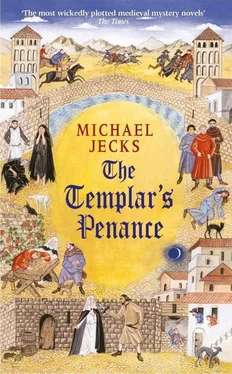Michael Jecks - The Templar
Здесь есть возможность читать онлайн «Michael Jecks - The Templar» весь текст электронной книги совершенно бесплатно (целиком полную версию без сокращений). В некоторых случаях можно слушать аудио, скачать через торрент в формате fb2 и присутствует краткое содержание. Год выпуска: 2014, ISBN: 2014, Издательство: Headline, Жанр: Исторический детектив, на английском языке. Описание произведения, (предисловие) а так же отзывы посетителей доступны на портале библиотеки ЛибКат.
- Название:The Templar
- Автор:
- Издательство:Headline
- Жанр:
- Год:2014
- ISBN:9781472219763
- Рейтинг книги:4 / 5. Голосов: 1
-
Избранное:Добавить в избранное
- Отзывы:
-
Ваша оценка:
- 80
- 1
- 2
- 3
- 4
- 5
The Templar: краткое содержание, описание и аннотация
Предлагаем к чтению аннотацию, описание, краткое содержание или предисловие (зависит от того, что написал сам автор книги «The Templar»). Если вы не нашли необходимую информацию о книге — напишите в комментариях, мы постараемся отыскать её.
The Templar — читать онлайн бесплатно полную книгу (весь текст) целиком
Ниже представлен текст книги, разбитый по страницам. Система сохранения места последней прочитанной страницы, позволяет с удобством читать онлайн бесплатно книгу «The Templar», без необходимости каждый раз заново искать на чём Вы остановились. Поставьте закладку, и сможете в любой момент перейти на страницу, на которой закончили чтение.
Интервал:
Закладка:
‘But why not?’ Gregory exclaimed.
‘Because someone arranged for Joana to go to that ford. He or she concealed your ex-wife’s horse so she couldn’t go, knowing that there was a blackmail attempt. Domingo did not get the money, though. The real killer must have done so.’
‘Unless the money was hidden by her.’
‘Or someone else,’ Simon agreed, his mind elsewhere.
Don Ruy’s voice rumbled again.
‘He says that he did not hear anything about any blackmail until later, when you spoke to him about the dead girl. Until then he had no idea,’ Gregory translated.
‘Yet someone must have known,’ Simon said. He was suddenly quiet as a fresh thought occurred to him. There were two others who definitely knew of the affair: Dona Stefania and the Fleming.
‘The blackmail stood to damage the Dona’s reputation,’ he mused. ‘And she lost all her money.’
‘I understand that she has nothing left,’ Gregory said. ‘She is living on the alms of the Cathedral — and the Fleming,’ he added with a hint of vitriol.
The Fleming, Parceval, Simon thought. He had Munio’s confirmation that he had collected money, and afterwards he was with Dona Stefania: she had confirmed that herself. Yet Simon felt there was something not right about the man — and the Prioress herself. She had arranged to have a band of pilgrims killed, if Gregory was right, just to avenge herself on her husband, but now she was living with Parceval more or less openly.
Gregory looked distressed. ‘I still don’t understand why my wife should have told her man to kill me. Twice she did so. Once when she set the whole gang on our band of pilgrims, and then secondly when she had him strike me down in the city. Why should she want to do that to me?’
‘A good question,’ Simon responded noncommittally.
‘Just goes to show my luck,’ Gregory said dismally. ‘Who else would be so unlucky as to marry a woman who could seek her own man’s murder?’
‘Strange that Domingo didn’t actually manage to kill you,’ Simon observed. ‘He was very practised at murder.’
‘It was odd,’ Gregory agreed. ‘It is hard for me to remember much about the attack, as my head was exploding. But I remember him warning me off my wife. Ha! He called me a “bloody bastard”! Can you believe that?’
‘In Galician?’ Simon asked.
‘No. Now you mention it, I think it was in English. I didn’t think a peasant like Domingo would speak English.’
‘No. I wouldn’t have thought he could,’ Simon agreed pensively.
That night, Simon felt the shaking and nervousness in his body again, as though his bones had developed a cold. He felt oddly sick, his appetite completely gone, and the rumbling in his belly boded ill. As soon as he could, he took to his bedchamber and closed his eyes, wishing away this malady before it could take hold.
As though denial might prevent anything worse than a temporary affliction, he had not mentioned his concerns to Margarita or to Munio, but they had noticed his lack of appetite. When he was woken in the middle of the night with terrible cramping pains in his belly, and vomited over the floor while sitting on his bedpot, he scarcely noticed his hostess and servants cleaning him and gently helping him back on to the clean sheets, but when he later fell asleep, he was enormously relieved to feel a woman’s cool hands calming him.
‘I love you, Meg,’ was all he said, and Margarita blinked in surprise, but said nothing when she saw he was already asleep.
Chapter Twenty-Three
It was two days after leaving Obidos that Baldwin at last rode up into the town of Tomar, feeling bone-weary and filthy after riding or walking throughout the hours of daylight.
Obidos had been useful. It took him little time to find a horse, although he regretted buying this one in particular, and while it was being saddled, he had bought two loaves and a little dried meat, which had tided him over the journey. A friendly priest had given him a blessing for his journey and rough directions, and Baldwin had covered several miles before nightfall.
His horse was, however, a skittish, evil-minded nag, a pony which had been broken-winded, and whose nostrils had been slit with a knife for several inches to improve its breathing, an operation which had not improved its temper in the least.
So far as Baldwin was concerned, the thing deserved to be killed for dogmeat. Especially when they arrived. Out of kindness, before going to the fortress, Baldwin rode to the river, the Rio Nabao, to let the beast drink. There was a ford here, and he rode halfway over to let the animal cool down, but once there the froward beast began dancing, and he was forced to cling on for dear life.
In some ways he couldn’t blame it. Sitting in the saddle in the middle of the river, Baldwin looked up at the great square lines of the walls and the central block tower, wondering whether he would be recognised, whether he could be arrested. Perhaps the horse had merely picked up a little of his own nervousness. There was something particularly unsettling about this place, a great fortress in which once he would have been welcomed with open arms by all the warriors living within, but where now, with the destruction of his own Order and its replacement by the Order of Christ, he was unsure how he might be greeted. All he could be sure of was that if there were a priest in the place, the man would want Baldwin arrested.
There was a tavern at the riverside, and he bound his horse to a post, then sat outside with a jug of wine and some bread, dipping the bread in olive oil, and eating shavings of strong-flavoured, dried ham. The wine was delicious, just as he remembered it — pale, cool and thirst-quenching. When he had finished his meal, he felt invigorated and ready for the horse again.
Baldwin could see its eyes rolling wildly as he approached. He had to spend time calming the thing before he could release it, and even then he had to mount it in one smooth movement before it could make its protests felt.
Soon he was walking it up the roadway towards the fortress. The town’s streets were all narrow, but bright under the high sun. There were few clouds, and the breeze, although welcome, was still hot. Baldwin knew full well that his friend Simon would have found this atmosphere all but unbearable, judging by the way he had responded to the warmth of Compostela, but for Baldwin this was marvellous. He could feel the heat seeping into his body, and he felt as though, having absorbed this warmth for the last few days, he had stored up a resource of heat that could keep him through any number of cold, snowy, wind-swept Devonshire winters.
He looked up at the hill. From here, the castle was only visible as a massy square tower up on the right, with a wall that reached around the top of the hill, following a concave sweep. Baldwin’s mood darkened. It felt almost as though he was slowly approaching his own doom, and that on top of this hill, he would find himself accused and held as a renegade Templar, a man to be treated as a heretic, to be arrested, tortured, and burned to death. And all, perhaps, for a pointless mission.
With that thought, he stopped and dismounted, wondering why he had thought that coming here might solve anything. This castle was no longer a Templar site, it was a fortress for a new Order, and nothing to do with him. If there were people here who felt pious, it would be their duty to arrest Baldwin and hold him until the authorities could deal with him. He had travelled here remembering his old Order as though he could return to his youth, or recover some of the happiness he had known as a young man — as though mere proximity to a Templar site could ease his soul and undo some of the foul injustices of the last decade. Yet how could it? This place was nothing more than a series of blocks of stone. It had no soul, no life. All it was was a place in which men lived and worked. It was no better nor worse than the men who lived in it.
Читать дальшеИнтервал:
Закладка:
Похожие книги на «The Templar»
Представляем Вашему вниманию похожие книги на «The Templar» списком для выбора. Мы отобрали схожую по названию и смыслу литературу в надежде предоставить читателям больше вариантов отыскать новые, интересные, ещё непрочитанные произведения.
Обсуждение, отзывы о книге «The Templar» и просто собственные мнения читателей. Оставьте ваши комментарии, напишите, что Вы думаете о произведении, его смысле или главных героях. Укажите что конкретно понравилось, а что нет, и почему Вы так считаете.












